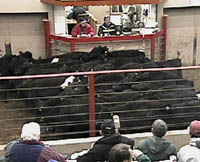KY Beef Producers Combine Calves at Non-Traditional Sale
KY Beef Producers Combine Calves at Non-Traditional Sale

Traditionally, cattle producers have been independent, especially where the sale ring in concerned. But, some Kentucky producers have begun partnering and combining similar calves in sales like one held at the Paris Stockyards Dec. 7. More than 1,000 head went through the ring and sold in just over an hour.
Producers saw a need for a marketing tool that helps all operations, small and large. The Central Kentucky Feeders view the sales as a way to inform and educate producers about what the market needs, while helping them add value to their product and dollars to their pocketbooks.
"We're beginning to develop a relationship that will hopefully lead to the purchasers out west demanding these type of cattle," said Gary Carter, Harrison County Extension Agent for Agriculture, said. "We have some really strong health requirements on these cattle."
Carter said all cattle that are eligible for the sale must meet 12 requirements, including being owned by the seller for at least 90 days, weaned at least 45 days, dehorned and healed, vaccinated, and identified with an official CKF tag. Additionally heifers are guaranteed open at sale time and steers are guaranteed not to be bulls.
Producers benefit by having their cattle meet these stringent requirements not only in market value, but also in reputation.
"We got into this because basically we'd been doing the weaning and the vaccinations and it was difficult to put the kind of numbers together where we really got a premium for it." said Catesby Simpson, Bourbon county cattle producer. "When you put the trouble into weaning the calves, you want people to know that. This (sale) gives us a chance to work with people in a way that puts big numbers together that really pull the buyers in."
Simpson pointed out the calves were bringing higher amounts than traditional sales and believes that is because of the quality that is beginning to be associated with the program.
"The next couple of years, they will be paying even more because it's going to become really clear to them the value of having cattle that don't get sick," she added.
Cattle were going about $6 to $7/cwt on average more than the same type calves sold in traditional sales.
Carter said the producers build unique working relationships with each other and with UK and Extension staff. The cattle come in the night before the sale and everyone works together to get them grouped together, fed, watered, tagged, etc.
A unique aspect of the CKF sales is the use of an electronic identification tag put on the cattle before they sell. This tag allows information to be recorded about each individual animal all the way through to the feedlot. The information can become an invaluable resource for producers making herd decisions back home.
"For me, the tags will show me some adjustments that maybe I need to make in my breeding program." said Steven Cunningham, a cattle producer from Harrison County. "I might need to step up and look at another type of bull. My main concern is pounds; I have to add pounds to my calves...the bigger the better."
"I think it's coming that we'll use this system for health reasons," Simpson said. "When you pick up a piece of meat in the supermarket, you'll be able to trace it all the way back to the cow/calf producer who raised it."
The Central Kentucky Feeders have been involved in this unique sales program for about three years. Carter says some western Kentucky counties are beginning to have the same kind of opportunities for their cattle producers. With plenty of room for more participation, it's bound to catch on and include many more producers in the future.
"These can evolve all over Kentucky," he said. "Daviess county for one, is getting started. But it's going to take awhile. It's a little bit of a slant from the old feeder cattle sales we used to do, only these cattle are pre-conditioned and weaned."
If you'd like more information on the Central Kentucky Feeders' sales, contact Bourbon County Extension agent for agriculture, Glen Mackie at (859) 987-1895, or your County Extension office.
